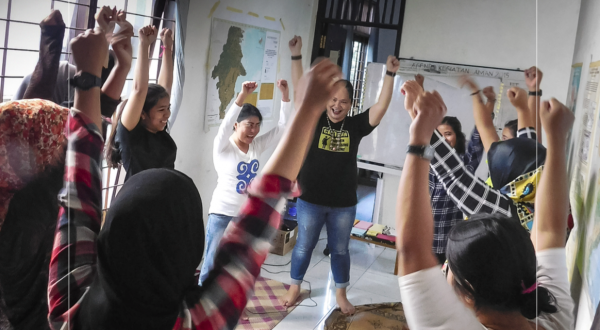The featured research in this newsletter reflects on the practice of implementing accountability initiatives in three areas – ICT-enabled health projects, the inclusion of young women in governance spaces, and citizen-generated data. Each of the three studies draws out valuable lessons for other practitioners.
In all three cases, analysis of accountability practice puts the spotlight on the vital role of the intermediaries who work to support citizen voice and enable governance changes in response.
ICT-facilitated accountability and engagement in health systems
Innovations in mHealth can potentially contribute to accountable health systems. Research into seven mHealth innovation and scaling projects funded by Making All Voices Count found that ICTs can successfully provide quick and easy ways of collecting and analysing information on health services. But linkages and relationships with communities, local officials and national decision-makers are needed for them to be effective as tools for accountability and citizen engagement.
Because local health workers are attending the community data validation meetings as well, they’re hearing the feedback from the community. They are reflecting on their own behaviour, or how the services they provide can create an impact. That’s creating a willingness to change.
Read the research report | Read the IDS Working Paper for a full literature review | Read a blog on Thuthuzela Voices, one of the mHealth projects in the report
Building safe spaces to support young women’s participation in local governance in Indonesia

Young women in rural Indonesia are systematically excluded from local spaces for governing and decision-making. This practice paper reports and reflects on action research during which young women across Indonesia engaged in understanding and challenging their exclusion – through building critical consciousness, organisational capacity and social relations of solidarity. It offers important insights on accountability from the margins, and emphasises the personal and political changes that necessarily precede the expanded citizen engagement that is often assumed to underpin accountability initiatives.
It matters who produces data: reflections on two citizen-generated data initiatives
The School Report Card, an initiative to increase parent participation in the schooling of their children in Kenya, and a community resource tracker project in Uganda are at the heart of this discussion of the purpose, use and users of citizen-generated data. The practitioner research carried out by the organisations that implemented these two projects has led them to refocus their work on citizen-generated data so that it champions findable, accessible, interoperable and reusable data, and encourages partnerships that facilitate the uptake of data.
Read the practice paper | Read the full report of the research | Read Ssanyu Rebecca’s blog on citizen-generated data
Other new research blogs
In search of productive local councillor-civil society engagement in South Africa (Evan Lieberman)
Insights that will last: making innovation projects count (Czarina Medina-Guce)
Understanding how to learn in Liberia (Heather Gilberds and Blair Glencorse)
Learning to make the political personal, and other lessons from Manila (Michael Moses and Sue Soal)
Practitioner reflections on digital technologies and citizen participation in the Philippines(Hilary Martinez)